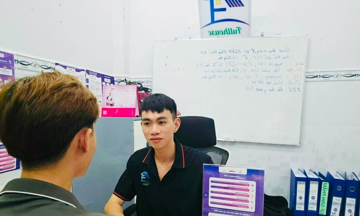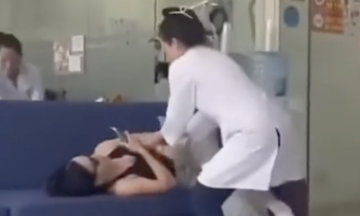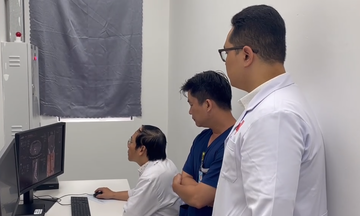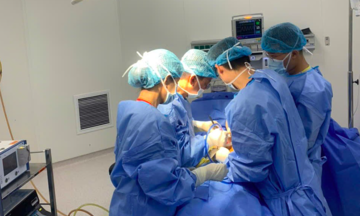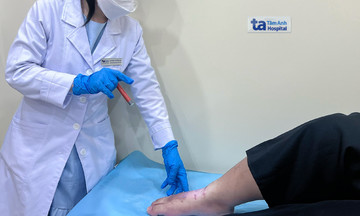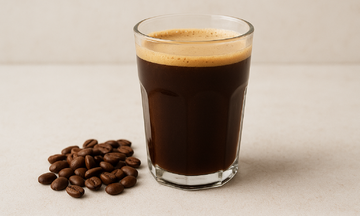Phuong Tra was accustomed to the high-rise office landscape of TP HCM, where she spent the first 13 years of her post-graduate career building a marketing career for international corporations. Now, at 40, she stands in a therapy room at Hospital 1A (under the Ministry of Health, specializing in orthopedics and rehabilitation), wearing a lab coat, carefully assisting a stroke patient with rehabilitation exercises.
Tra's journey from the world of marketing to physiotherapy began in 2020 when her father suffered a stroke relapse and became mostly bedridden. According to the World Health Organization, stroke is the second leading cause of death globally, affecting 15 million people each year. In Vietnam, this figure reaches 200,000 new cases annually.
"Seeing my father immobile, I knew I couldn't just stand by and place the entire burden on my mother," Tra recalls. Her decision wasn't solely based on family affection. She recognized a significant gap in Vietnam's rehabilitation care system, where the ratio of physiotherapists to the population is only 0.02%, compared to the WHO standard of 0.1%.
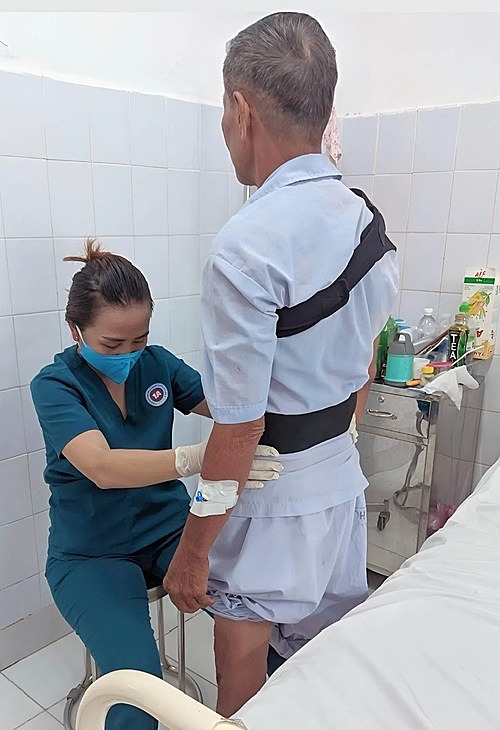 |
Tra provides physiotherapy to a hemiplegic stroke patient at Hospital 1A. Photo: Phuong Le |
Tra provides physiotherapy to a hemiplegic stroke patient at Hospital 1A. Photo: Phuong Le
While maintaining her job at the foreign corporation, Tra began studying for an associate degree in physiotherapy and rehabilitation. She had experience teaching therapeutic yoga and studying natural detoxification in the Philippines, but realized she needed more specialized knowledge to effectively support her father.
Her schedule became packed: working during the day, attending school in the evenings, and practicing on weekends. "My colleagues wondered why I was making things so difficult for myself. They didn't understand that every anatomy lesson, every technique I learned, could help my father recover a little more," she expresses.
The turning point came when Tra decided to quit her job to undertake a 9-month internship at Hospital 1A starting in 7/2023. The initial days in the clinical environment were shocking, witnessing patients' incontinence, lifting patients weighing tens of kilograms, and having saliva land on her coat. "From a girl who was afraid of getting dirty, I forced myself to get used to it," she admits.
But just two months into her internship, her father passed away. "I left my motorbike at the hospital and rushed to the airport to catch the earliest flight back to Da Nang," she recalls. "When my father died, I wanted to give up. But the feeling that I still owed him something made me decide to pursue a bachelor's degree. If I couldn't do it for my father in time, at least I could do it for other patients, for other families facing similar situations."
Last July, Tra received her bachelor's degree with honors in Rehabilitation Techniques – her third university degree, but with a completely different significance. "This is the most meaningful degree because it is tied to the greatest pain and motivation in my life," she says.
Cu Van Nam, Chief Technician of the Rehabilitation Department at Hospital 1A, has observed Tra since her early days. "Tra stands out for her dedication and professionalism," he assesses. "She often volunteers for shifts in the area with critically ill patients and isn't afraid of challenges. What's special is that she not only focuses on technique but also listens to patients' stories, providing them with emotional support."
 |
Tra receives her bachelor's degree in Rehabilitation Techniques in July and a certificate of merit with honors. Photo: Provided by the subject |
Tra receives her bachelor's degree in Rehabilitation Techniques in July and a certificate of merit with honors. Photo: Provided by the subject
Tra's current job at the public hospital pays only a few million VND, significantly less than her previous income. But she finds meaning in the small progress of her patients, witnessing a paralyzed patient sit up after a month, or a child with cerebral palsy beginning to cooperate in exercises.
"I used to think happiness was business trips and glamorous events. Now, just seeing a patient stand up after a stroke is enough to make my whole day," Tra confides.
While working, she also witnesses the scene of a young woman caring for her sick father, a son patiently changing his mother's diapers. These images bring tears to her eyes behind her mask. "I cry because I couldn't do that for my father, and I feel unfilial. I studied a lot, worked a lot, but I'm still less than these ordinary people who care for their parents with all their love," she shares.
To maintain her income, in addition to her hospital job, she also teaches yoga and provides nutritional coaching for chronic diseases. Tra plans to continue her studies at the master's level to further her expertise.
September 8th is designated as World Physiotherapy Day. For Tra, this meaning is even more pronounced as each patient's recovery becomes a motivation for her to go further in her profession. "If you're considering a career change, don't be afraid to start over, no matter your age. Who knows, what you think you can't do might become the most meaningful path of your life," she shares.
Le Phuong



